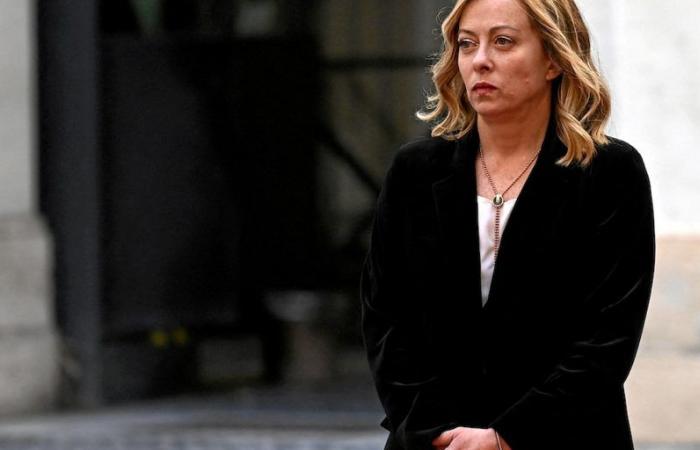« S“unrealistic”, this is the adjective used by Giorgia Meloni to describe the method of designating the highest positions in the European Union. “It is surreal that the names of the main EU positions are presented without even pretending to discuss the signals sent by voters,” she judges. A scathing expression which precedes the opening of the European Council on Thursday in Brussels, where the 27 will decide on the renewal of Ursula von der Leyen as head of the European Commission.
Meloni’s anger crystallizes the tensions surrounding this crucial exercise for the next five years of the EU. While six European leaders of central parties (Donald Tusk and Kyriakos Mitsotakis for the EPP, Olaf Scholz, Pedro Sanchez for the Social Democrats, Emmanuel Macron and Mark Rutte for Renew) announced their support for a “package” of nominations, including Ursula von der Leyen as President of the Commission, António Costa as head of the European Council, and Kaja Kallas as high representative for foreign affairs, the Italian leader cries out for the denial of democracy.
“No one respects Mme Meloni more than me, really, defends Donald Tusk. This is a misunderstanding. Sometimes we need a political platform to make the process easier. That was our intention with this format between our three groups. The final decision rests with the European Council, and therefore with Mme Melons. »
A right turn ignored?
At the heart of the controversy: the results of the recent European elections. Von der Leyen’s European People’s Party emerged as the big winner with 189 seats, but Parliament also shifted to the right. Meloni’s European Conservatives and Reformists (ECR) group gained seats (83 seats), becoming the third political force ahead of the centrist liberals of Renew (74 seats).
“Some claim that citizens are not wise enough to make certain decisions and that oligarchy is the only acceptable form of democracy, but I do not agree,” Giorgia Meloni insisted in front of the Italian Parliament on Wednesday. She accuses EU leaders of wanting to “sweep the dust under the carpet” rather than recognizing the discontent of many voters.
Italy’s demands
Giorgia Meloni does not just criticize. She formulates specific demands: a leading economic portfolio for Italy in the next Commission, as well as a position of executive vice-president. Italy, because it is the third largest economy, will always get a large portfolio.
Judge for yourself: the outgoing Commissioner, Paolo Gentiloni, is in charge of economic affairs. Before him, Federica Mogherini was the High Representative and Vice-President of the Commission (the two positions are linked). Antonio Tajani was Vice-President of the Commission in charge of Industry, and before that of Transport. Franco Frattini was Commissioner for Justice from 2004 to 2008. Mario Monti, between 1999 and 2004, was in charge of Competition, a State within a State within the Commission. In other words, Italy, a founding country, has never been badly treated.
There is no reason for Ursula von der Leyen to neglect the Meloni government. However, “President von der Leyen has not promised anything so far to any Member State,” assures a senior Commission official. Who can believe in this fable?
The outgoing president of the Commission is campaigning for her renewal. It received complaints from all member states. Imagine for a moment that she could respond to Emmanuel Macron, to Olaf Scholz, to Giorgia Meloni, to Donald Tusk, to Pedro Sanchez: “Sorry, I can’t promise you anything until I’m officially in office » ?
A complex balancing act
Giorgia Meloni is a bit provocative by wanting a commissioner who attacks the “bureaucracy” of the European Union. When we know to what extent Italy, due to its bureaucracy, is struggling to implement the gigantic recovery plan of 195 billion euros…
In the face of these criticisms, defenders of the current process stress the complexity of the exercise. “It’s a real headache,” confides a European diplomat on condition of anonymity. “We have to take into account geographical, political, and gender balances, while reflecting the new political realities emerging from the ballot box. It’s a balancing act that is more complex than ever.”
However, Giorgia Meloni’s party, Fratelli d’Italia, is not part of the tripartite parliamentary coalition (PPE, S&D and Renew). By standing alongside the sovereignists, on the fringes of the center left and the center right, Giorgia Meloni is, in fact, weakening her position in the distribution of the highest positions in the Union.
A test for European unity
The ability of the 27 to agree on these key positions will be closely scrutinized, both by European citizens and by the EU’s international partners. Virulent reactions, like that of Meloni, underline the divisions which persist within the Union where we must expect a coup from Viktor Orban, violently opposed to Ursula von der Leyen. The Slovak President, Peter Pellegrini (who replaces Prime Minister Fico, who is hospitalized), was received by Ursula von der Leyen on Friday. He expresses reservations about Kaja Kallas and Antonio Costa.
Formally, “top jobs” are awarded by qualified majority. Mathematically, Giorgia Meloni and Viktor Orban do not have the means to block the designation of the package. But custom dictates that consensus prevails between the 27.
It is rumored that Giorgia Meloni would demand a piecemeal vote, position by position. She would abstain on Ursula von der Leyen and Kaja Kallas but would vote against the socialist Antonio Costa. It is up to Charles Michel, the President of the Council, to organize this discussion.
Beyond personalities, the European Council of June 27 and 28 should adopt the “strategic agenda” of the mandate. A document of a few pages, still under discussion. According to the document, several major axes are addressed: the strengthening of defense and security, the revival of economic and industrial competitiveness, the protection of democracy and fundamental rights, as well as the adoption of an approach more pragmatic and flexible in the implementation of the Green Deal.
The agenda also highlights the importance of investments and addresses issues of enlargement and internal reforms. These guidelines aim to guide the action of the European Union for the years to come, adapting to new challenges while maintaining fundamental objectives such as the ecological transition. The strategic agenda must serve as a compass for the work program of the next Commission.






